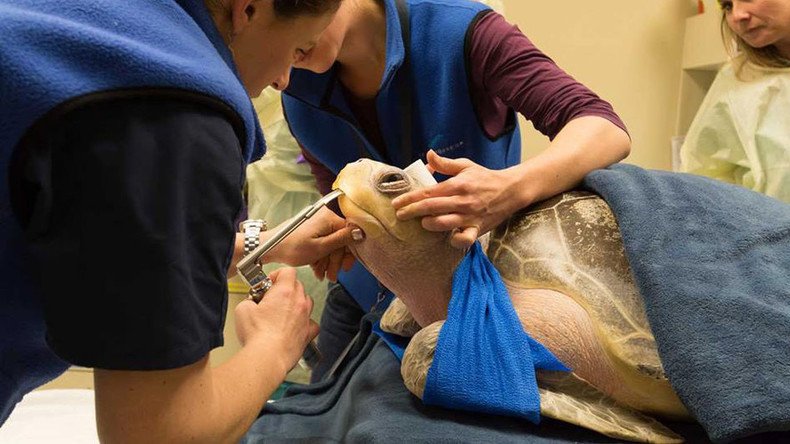Wild turtle too gassy to dive for food gets treated for 'the bends' in fancy hospital

Poor Tucker! The olive ridley sea turtle is hundreds of miles from home and suffers from a big bubble in his belly, making him too buoyant to dive for food or away from predators.
Little fun for your Friday: Tucker the gassy sea turtle treated for the bends so he can dive https://t.co/1PwOya6qRipic.twitter.com/EjR1dktIoj
— Oceana (@Oceana) April 1, 2016
The 20-year-old tetrapod was found near death on Cannon Beach in the US state of Oregon last December, and after some rehab at the Seattle Aquarium, he was taken to a nearby hospital this week to become the first non-human to receive treatment in its hyperbaric center.
Usually reserved for homo sapiens with decompression sickness known as 'the bends', wounds that won’t heal, or carbon monoxide poisoning, Tucker got top class treatment even though he doesn’t have Obamacare.
Since his species is native to Mexico and southern California (read he’s a long way from home), it’s only a matter of time until someone wearing a Trump hat complains about this “illegal immigrant” getting free medical care.
Oh look, Trump was right again! Illegal Immigrants Get Public Health Care, Despite Federal Policy; MAKE UP 25% OF U… pic.twitter.com/e89iRfA6Xw
— Donald Trump News (@trumpforwin) March 25, 2016
The center's medical director James Holm, who is reportedly an avid scuba diver, told the Guardian: “We have treated many scuba divers over the years for a gas bubble disease known as decompression sickness, which is also called ‘the bends’. This is the first time we have been asked to assist in the care of a sea turtle, which are excellent divers themselves.”
Tucker was given pure oxygen in the chamber and a video posted on Thursday shows he’s getting along just swimmingly.
Tucker the Turtle is recovering at @SeattleAquarium from hyperbaric treatment at @VirginiaMasonpic.twitter.com/lZfMa7yEv1
— Jeff Pohjola (@JeffPohjola) March 31, 2016
For whatever reason, Tucker couldn’t let the belly bubble out the old fashioned way, even though turtles are known for epic breaking of wind (and sometimes water).
Tucker won’t be returned to the wild until he’s able to regulate his buoyancy, because he won’t survive if he can’t dive for food or to avoid human predators on their oil-powered boats.
Speaking of oil, or rather the climate change and rising ocean levels caused by the human use of oil, the ability of sea turtles to hatch their eggs is being disrupted.
As this video from the New England Aquarium explains, turtles that follow their ancient instincts and return to the beach of their birth, often find the ocean has swallowed it up.












